Unit 10 If you go to the party, you'll have a great time!复习课件39张
文档属性
| 名称 | Unit 10 If you go to the party, you'll have a great time!复习课件39张 | 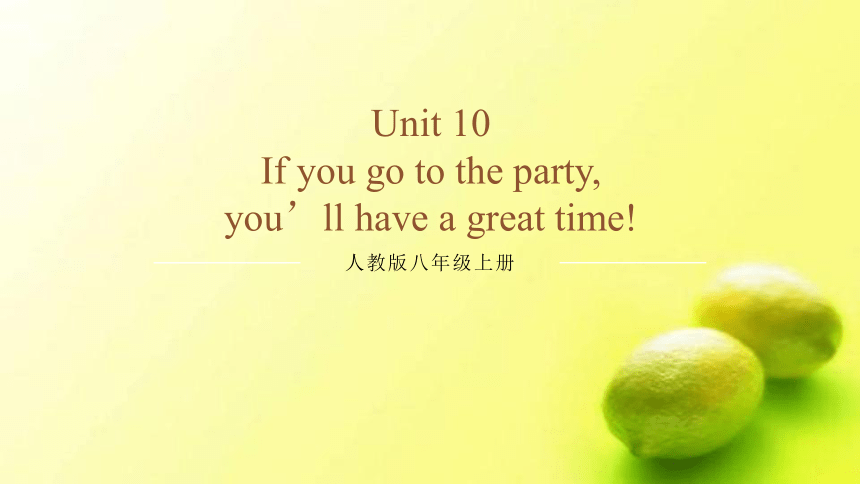 | |
| 格式 | zip | ||
| 文件大小 | 892.6KB | ||
| 资源类型 | 教案 | ||
| 版本资源 | 人教新目标(Go for it)版 | ||
| 科目 | 英语 | ||
| 更新时间 | 2021-12-04 21:09:17 | ||
图片预览



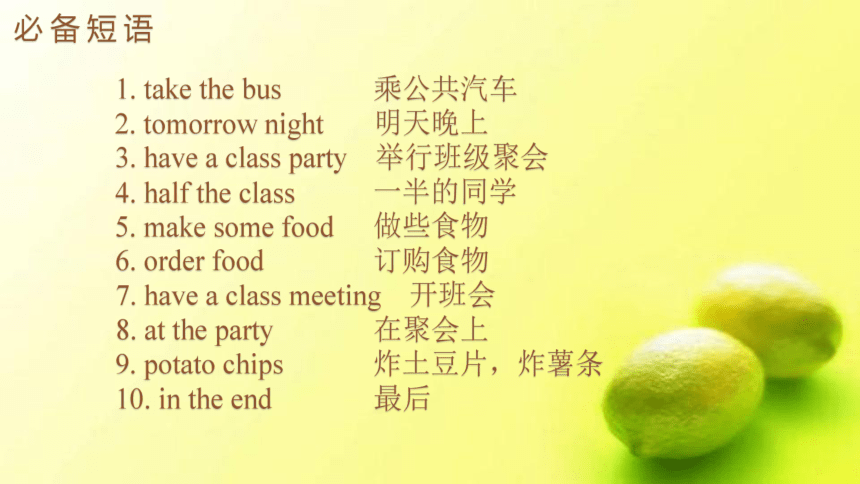
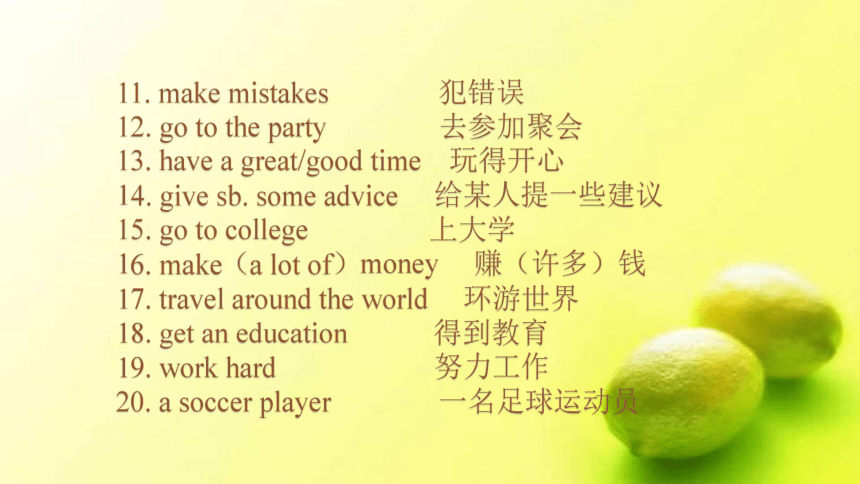
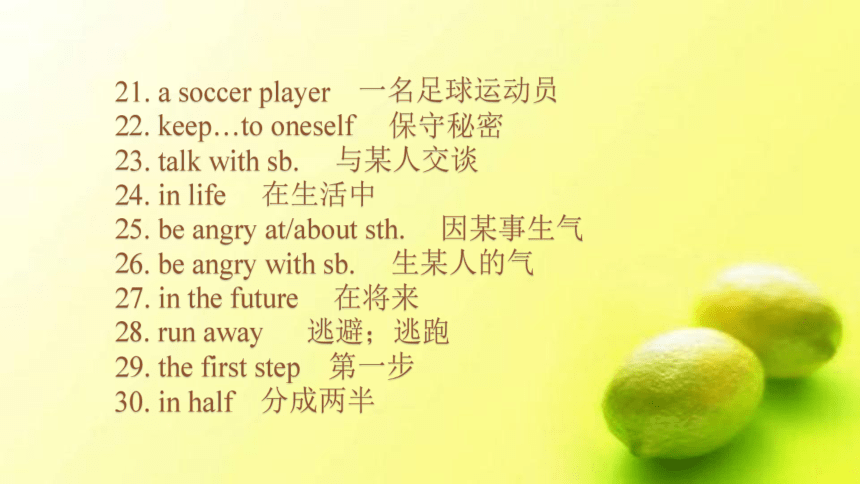
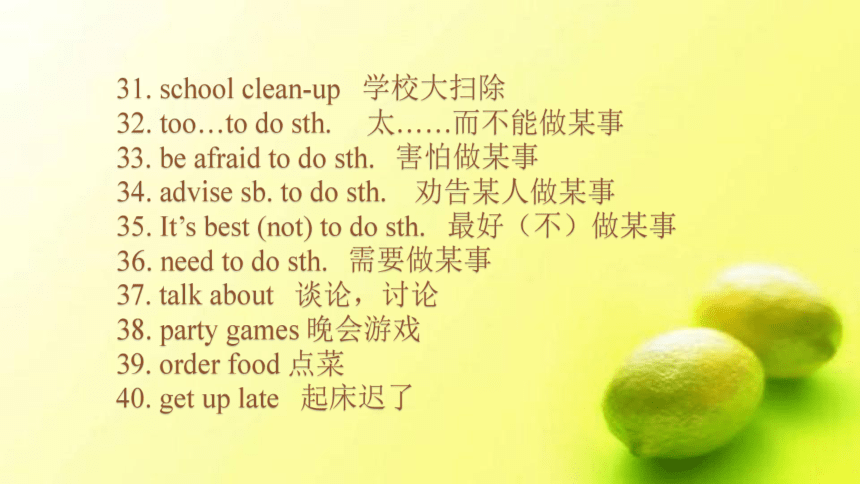
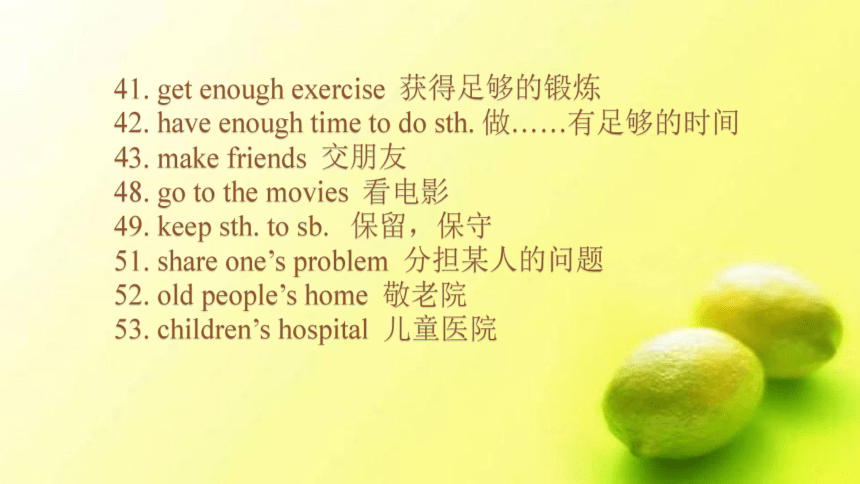


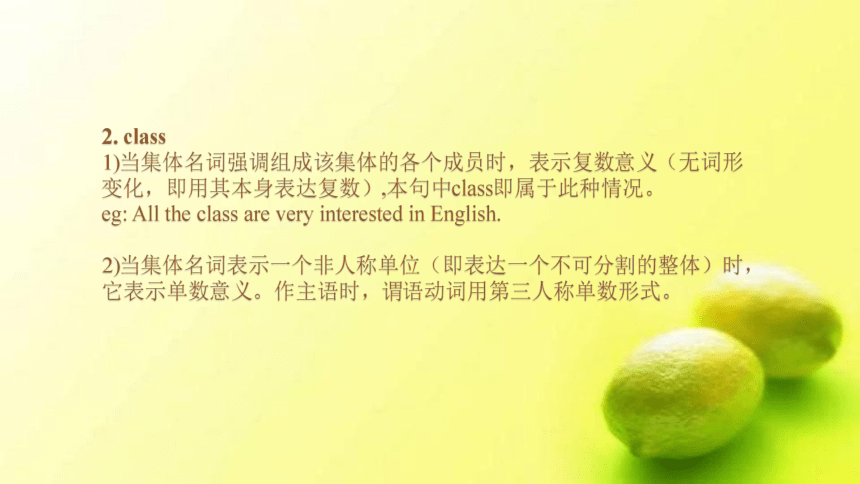
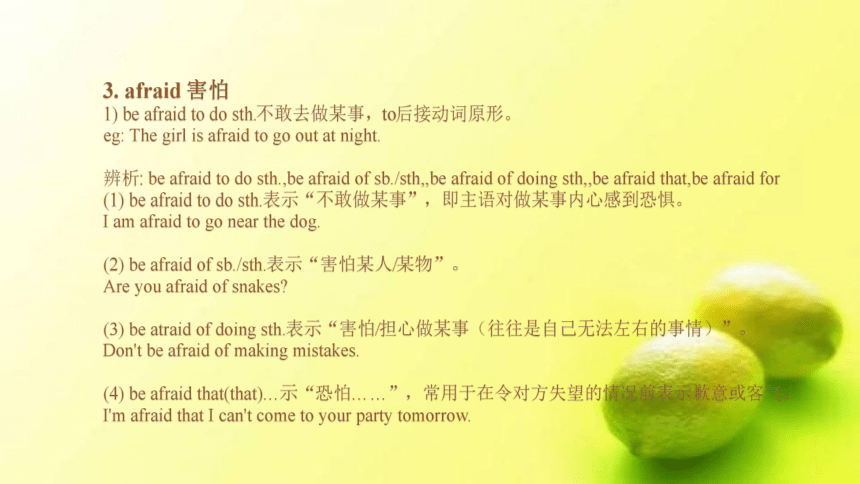
文档简介
(共39张PPT)
人教版八年级上册
Unit 10
If you go to the party, you’ll have a great time!
目录
重难点解析
02.
习题巩固
04.
基础知识
01.
语法聚焦
03.
基础知识
PART ONE
必 备 短 语
1. take the bus 乘公共汽车
2. tomorrow night 明天晚上
3. have a class party 举行班级聚会
4. half the class 一半的同学
5. make some food 做些食物
6. order food 订购食物
7. have a class meeting 开班会
8. at the party 在聚会上
9. potato chips 炸土豆片,炸薯条
10. in the end 最后
11. make mistakes 犯错误
12. go to the party 去参加聚会
13. have a great/good time 玩得开心
14. give sb. some advice 给某人提一些建议
15. go to college 上大学
16. make(a lot of)money 赚(许多)钱
17. travel around the world 环游世界
18. get an education 得到教育
19. work hard 努力工作
20. a soccer player 一名足球运动员
21. a soccer player 一名足球运动员
22. keep…to oneself 保守秘密
23. talk with sb. 与某人交谈
24. in life 在生活中
25. be angry at/about sth. 因某事生气
26. be angry with sb. 生某人的气
27. in the future 在将来
28. run away 逃避;逃跑
29. the first step 第一步
30. in half 分成两半
31. school clean-up 学校大扫除
32. too…to do sth. 太……而不能做某事
33. be afraid to do sth. 害怕做某事
34. advise sb. to do sth. 劝告某人做某事
35. It’s best (not) to do sth. 最好(不)做某事
36. need to do sth. 需要做某事
37. talk about 谈论,讨论
38. party games 晚会游戏
39. order food 点菜
40. get up late 起床迟了
41. get enough exercise 获得足够的锻炼
42. have enough time to do sth. 做……有足够的时间
43. make friends 交朋友
48. go to the movies 看电影
49. keep sth. to sb. 保留,保守
51. share one’s problem 分担某人的问题
52. old people’s home 敬老院
53. children’s hospital 儿童医院
重难点解析
PART TWO
1. have a great time“过得愉快,玩得高兴”
1)相当于 have a good/pleasant/nice/wonderful time,enjoy oneself , have fun .
eg: During the holiday I had a great time.
①have a great/good time常用来表示祝愿,回答时可以用“Thank you,I will.”等。
②表示“过得愉快”的这些词组如果后面接动词都用doing。
2. class
1)当集体名词强调组成该集体的各个成员时,表示复数意义(无词形变化,即用其本身表达复数),本句中class即属于此种情况。
eg: All the class are very interested in English.
2)当集体名词表示一个非人称单位(即表达一个不可分割的整体)时,它表示单数意义。作主语时,谓语动词用第三人称单数形式。
3. afraid 害怕
1) be afraid to do sth.不敢去做某事,to后接动词原形。
eg: The girl is afraid to go out at night.
辨析: be afraid to do sth.,be afraid of sb./sth,,be afraid of doing sth,,be afraid that,be afraid for
(1) be afraid to do sth.表示“不敢做某事”,即主语对做某事内心感到恐惧。
I am afraid to go near the dog.
(2) be afraid of sb./sth.表示“害怕某人/某物”。
Are you afraid of snakes
(3) be atraid of doing sth.表示“害怕/担心做某事(往往是自己无法左右的事情)”。
Don't be afraid of making mistakes.
(4) be afraid that(that)…示“恐怕……”,常用于在令对方失望的情况前表示歉意或客气。
I'm afraid that I can't come to your party tomorrow.
4. meeting n.会议;集会;会面。
eg: We will have a meeting next Friday.
→have a class meeting意为“开一次班会”。
固定搭配: have/hold a meeting开会
attend a meeting出席会议
call a meeting召集会议
meeting place 会场。
5. upset adj.“难过的,失望的,沮丧的
短语:be upset about/that(对……感到难过)
→upset v.“使苦恼,使心烦,使不适”,“打乱,扰乱”。
eg:Dad was very upset that you didn't phone.
She upset our plan.
6. travel v.&.n.旅行;游历
eg: My father has traveled all over the world.
→travel+表示人的后缀-er→travel(l)er n.旅行者。
辨析:travel,trip
(1)travel可做名词或动词,泛指从一地到另一地旅行这一总的概念,常指长时间、远距离的旅行,尤指出国旅行。
eg: Did you enjoy your travels in China
(2)trip多指目的明确、短途的往返旅行,强调在路上所花的时间和所走的路程。
eg: She is on a business trip to Changsha.
1. The students are talking about when to...
1)talk about “谈论”,用于表示谈话双方都知道的话题,其后可以接人或事物,若接人要用人称代词的宾格形式。
eg: What were they talking about
相关短语:
①talk to “对……说话; 跟……谈话”,= speak to 强调单方面行为
eg: She always wants to talk to her classmates in class.
②talk with“与……交谈”,=have a word with 强调双方的行为
eg: She was talking with her classmate when I came in.
2. What will Mark organize
1) organize v.组织; 筹备
eg: We'll organize an English contest.
→organized adj.有组织的; 被组织起来的。
→organizer n.组织者。
→organization n.组织; 机构; 团体
eg: It is a non-profit organization.
3. If we ask people to bring food, they'll just bring potato chips and chocolate because they'll be too lazy to cook.
1) ask sb. to do sth. “让某人做某事”,否定结构:ask sb. not to do sth.
eg: My father asked us to get up early every day.
Their teacher asks them not to draw on the wall.
4. Also, I'm not sure how to go to the party.
1) I'm not sure=I don't know, be sure“确信:有把握”,后面可接that从句,也可接of或about短语
eg: He’s sure that he can run faster than you.
He thinks he is coming, but he’s not sure about it.
You are sure of winning the game this time.
→be sure+动词不定式,表示说话人的推测,意为“一定; 必然会
eg: It is sure to be fine tomorrow.
→be sure to do用于祈使句时,“务必要……(你)一定要……”。
eg: Be sure to write to her often.
5. If I take a taxi, it will be too expensive.
①expensive adj.昂贵的; 高价的,比较级为more expensive,最高级为 most expensive
eg: It is too expensive for her to buy.
→表示某物物的贵贱用“物+be+expensive/cheap/inexpensive"
→表示某物价格的高低用"The price of+物+be+high/low"
eg: She is always complaining about high prices.
The shirt was too expensive for Jim to buy.
6. Unless we talk to someone,we'll certainly feel worse.
1)unless引导条件状语从句,意为“除非”,在意义上相当于if... not.如果主句中使用一般将来时,在时间和条件状语从句中常用一般现在时来表示将来。
eg: You will fail unless you study hard.=You will fail if you don't study hard.
Unless you put on your coat, you'll catch a cold.=If you don't put on your coat,you'll catch a
cold.
Don't move the instruments unless I allows you.
2) certainly adv.无疑:肯定; 当然; 行。
—Could you help me take these books to the classroom
—Certainly.
注意:certain adj.确实的; 无疑的; 某; 某些; 某个。
eg: She was certain she would succeed.
7. She was afraid to tell her parents about it.
1) be afraid to do sth.“害怕做某事”,=be afraid of doing sth.
eg: I'm afraid of telling her.
→I’m afraid “害怕”,是一种提出异议,说出令人不快事情时的委婉说法。
eg: I'm afraid he won't come.
→I'm afraid 后可接 so 成 not,表示肯定时用so,表示否定时用not.
—Will he be late again
—I'm afraid so/not
8. If I tell my parents, they'll be angry!
1) angry adj.发怒的; 生气的
→be angry with对……感到生气,with后接人。
eg: Mr.Smith was angry with the woman upstairs.
→be angry at/about 对......感到生气. at/about 后接事。
eg: He is angry at/about that.
9. In the end, she talked to her parents and they were really understanding.
1) in the end “最后”,=at last / finally,用于表示经过一些曲折,拖延,等候等的“最后“终于”。
eg:I waited for hours and finally /at last/ in the end he arrived.
10. Her dad said he sometimes made careless mistakes himself.
1)careless adj. 粗心的; 不小心的。
eg: If you are careless, you will make more mistakes.
→care n.关怀,照料
→careful adj.小心的
→carefully adv.小心地。
2) mistake n.错误:失误:过失
eg: The girl made a serious mistake.
→mistake v.弄错; 误解:把……误认为
短语:mistake...for...“把……误认为……”
eg: I often mistake Tom for his brother.
②by mistake错误地; 无意地。
eg: She took the umbrella by mistake.
一言辨异:I made some mistakes in spoken English by mistake.
11. It is best not to run away from our problems.
1)It is best to do sth.=had better do sth.
二者的否定形式为It is best not to do sth.和had better not do sth.
eg: It is best not to open the door.
You'd better not open the door.
2) run away from 逃避;从……逃跑
eg: She always tried to run away from responsibilities when an accident happened.
12. He thinks the first step is to find someone you trust to talk to.
1) step n.步:步骤。
eg: This won't solve the problem but it is a step in the right direction.
2)step v.踏; 踩; 迈步; 行走。
eg: She turned around quickly and stepped on his toes.
固定搭配:step by step一步一步地
eg: They should enrich their knowledge step by step.
13. Students often forget that their parents have more experience, and are always there to help them.
①experience作“经验; 体验”讲时,是不可数名词,其后常与of/in搭配;
②experience作“经历; 阅历”讲时,是可数名词。
eg: I had an unusual experience last month.
She related some of her experiences in Xinjiang.
③experience v.经历; 体验
eg: Did she experience the life in the countryside
14. Who else can you get advice from
1) else意为“另外; 其他的”,主要用在who,whose,what,where,when等疑问词或nobody,nothing,somebody,something,anybody,anything等不定代词之后,其后可带's。
eg: He asked what else you would like.
Where else are you going to stay
2) other作形容词修饰名词时,须放在名词之前。
eg: What other things are there on the table
→other作代词,表示“(两者中的)另一个”,且能与one搭配构成one...the other...结构,表示“一个……另一个……”,而else没有这种用法。
eg: He has two brothers. One is a teacher, the other is a driver.
15. Can you give me some advice please
1) advice n.劝告;建议。不可数名词。
eg:Let me give you a piece of advice.
固定搭配: a piece of advice 一条建议/忠告
take/follow one's advice 接受/听从某人的建议
2) advise v.忠告;建议
短语:advise sb.to do sth.建议某人做某事。
eg: He advised me to buy a computer.
3)辨析:advice&suggestion
advice 不可数名词,多指有指教性的“意见”或“劝告”。
suggestion 可数或词,多指为改进工作或解决困难等而提出的“意见"或"建议"
16. If people have problems, they should keep them to themselves.
1) keep sth to oneself “保守某事的秘密”。
eg: We should keep it to ourselves.
2)keep做系动词,意为“保持(某种状态)”,其后常接形容词做表语。
eg: Please keep quiet!
3)keep v.“保存;保留;坚持;继续;保持”。
eg: If you keep (on) practicing your spoken English, you'll soon make great progress.
17. We should always try to solve them.
1) solve v.解决; 解答。
eg: People are trying to solve the problem of water shortage.
→solution n.解答:解决办法。
eg:It may take a long time to find a solution to the problem
18. Let’s order food from a restaurant. 让我们从餐厅点菜吧。
1) order n.&.v.点菜;订购;订货。
→take one's order点菜;"
→order sth.from+地点”表示“从某地订购某物”;
→order sth. for sb.=order sb.sth.为某人订购某物。
eg:May I take your order,sir
Could you please order lunch for me
2)order n.顺序;v.命令。
→order sb.to do sth.命令某人做某事。
eg: The policeman ordered me to park my car there.
语法聚焦
PART Three
if 的 用 法
if引导的从句称为条件状语从句
其结构为“if+陈述句(主语+谓语+其他)”,“如果……”。if引导的从句可放在主句前,也可放在主句后。
(一)if引导的条件状语从句的用法如下
1.在含有条件状语从句的复合句中,如果主句是一般将来时,从句用一般现在时代替一般将来时。
eg: If you go to the party,you'll have a great time.
2.主句中含有can,may,must等情态动词时,if从句用一般现在时。
eg: If I finish my homework.I can watch TV.
3.主句是祈使句,if从句用一般现在时
eg: Don't forget to lock the door if you are the last one to leave.
(二)if条件句与其他句式的转换
1.不定式短语与条件状语从句之间的转换。
eg: It will be a great mistake for us to wait another week .
→It will be a great mistake if we wait another week.
2.“祈使句+and/or+陈述句”句式中的祈使句相当于一个计引导的条件状语从句。如果用and连接,那么if引导的条件状语从句要用肯定形式,如果用or连接,则用否定形式。
eg: Work hard and you will catch up with your classmates.
→If you work hard,you'll catch up with your classmates.
eg: Hurry up, or we'll miss our train.
→If we don't hurry up,we'll miss our train.
1. Our world will get better and better _____ each of us lives a greener life.
A. before B. if C. though
2.—I think everyone should play a part in saving our environment.
—I agree. For example, there will be less air pollution _____ we drive less.
A. if B. so C.though
3. If we _____take environment problems seriously, the earth ___ worse and worse .
A. don't;won't be B. won't; isn't C. don't;will be
4.—I don't know if it _____ tomorrow.
—Well, if it _____, the school sports meet will be canceled.
A. will rain;will rain B. rains;will rain C. will rain;rains
5. You'll have a great time _____ you go to the party.
A. so B. if C.although
6. Nobody knows if he_____. if he _____ here, I’ll call you at once.
A. will come;will arrive B. will come;arrives C. comes;will arrive
7. ____ you don't go to bed earlier,you will feel tired tomorrow.
A. Unless B. If C.Though
8. If my father ____ back, please let me know.
A. comes B. will come C. come
9.—Tommy,do you know if Frank ______ to the theater with us this Sunday if it ____
—Sorry,I have no idea.
A. will go;is fine B. goes;is fine C. goes;will be fine
10.—Mike,could you tell me if Mary ____ to my party tomorrow
—I think she will if she ____ time.
A. comes;has B. comes;will have C. will come;has
习题巩固
PART FOUR
1. If you join the band, maybe you’ll______.
A.famous B.be famous C.being famous D.not famous
2. —Can you guess if Mike______ swimming this afternoon
—I think he will go with us if he ______ free.
A.will go;is B. will go;will be
C.goes;is D. goes;will be
3. —What time will Diana get to Chengdu
—I’m not sure. When she______, I’ll call you.
A.will arrive B.arrive C.arrives D.arrive at
4.Talk to your teacher and you will get help______ you have a problem.
A.unless B.if C.until D.so
5. —I don’t know if my aunt______ to my house next week.
—If she_______,I’ll meet her at the airport.
A.will come;comes B.comes;will come
C.will come;will come D.comes;comes
1.Kate,remember _______ for the sick to cheer them up.
A.to sing B.not to sing C.singing D. sang
2. Many teenagers always don’t _______their parents. They have their own ideas.
A. agree with B.worry about C. laugh at D.care for
3._______ you use your dictionary often, your spelling will improve.
A. Whether B.If C. Though D.While
4. —Could you give me some_______ on how to learn English _______
—Sure. Practice makes perfect.
A.advice;good B.suggestions;good
C.advice;well D.suggestion;well
5. —Shall we go for a picnic in the forest park tomorrow
—Yes,_______ it rains heavily.
A.if B.unless C.until D. when
感谢您的欣赏
人教版八年级上册
Unit 10
If you go to the party, you’ll have a great time!
目录
重难点解析
02.
习题巩固
04.
基础知识
01.
语法聚焦
03.
基础知识
PART ONE
必 备 短 语
1. take the bus 乘公共汽车
2. tomorrow night 明天晚上
3. have a class party 举行班级聚会
4. half the class 一半的同学
5. make some food 做些食物
6. order food 订购食物
7. have a class meeting 开班会
8. at the party 在聚会上
9. potato chips 炸土豆片,炸薯条
10. in the end 最后
11. make mistakes 犯错误
12. go to the party 去参加聚会
13. have a great/good time 玩得开心
14. give sb. some advice 给某人提一些建议
15. go to college 上大学
16. make(a lot of)money 赚(许多)钱
17. travel around the world 环游世界
18. get an education 得到教育
19. work hard 努力工作
20. a soccer player 一名足球运动员
21. a soccer player 一名足球运动员
22. keep…to oneself 保守秘密
23. talk with sb. 与某人交谈
24. in life 在生活中
25. be angry at/about sth. 因某事生气
26. be angry with sb. 生某人的气
27. in the future 在将来
28. run away 逃避;逃跑
29. the first step 第一步
30. in half 分成两半
31. school clean-up 学校大扫除
32. too…to do sth. 太……而不能做某事
33. be afraid to do sth. 害怕做某事
34. advise sb. to do sth. 劝告某人做某事
35. It’s best (not) to do sth. 最好(不)做某事
36. need to do sth. 需要做某事
37. talk about 谈论,讨论
38. party games 晚会游戏
39. order food 点菜
40. get up late 起床迟了
41. get enough exercise 获得足够的锻炼
42. have enough time to do sth. 做……有足够的时间
43. make friends 交朋友
48. go to the movies 看电影
49. keep sth. to sb. 保留,保守
51. share one’s problem 分担某人的问题
52. old people’s home 敬老院
53. children’s hospital 儿童医院
重难点解析
PART TWO
1. have a great time“过得愉快,玩得高兴”
1)相当于 have a good/pleasant/nice/wonderful time,enjoy oneself , have fun .
eg: During the holiday I had a great time.
①have a great/good time常用来表示祝愿,回答时可以用“Thank you,I will.”等。
②表示“过得愉快”的这些词组如果后面接动词都用doing。
2. class
1)当集体名词强调组成该集体的各个成员时,表示复数意义(无词形变化,即用其本身表达复数),本句中class即属于此种情况。
eg: All the class are very interested in English.
2)当集体名词表示一个非人称单位(即表达一个不可分割的整体)时,它表示单数意义。作主语时,谓语动词用第三人称单数形式。
3. afraid 害怕
1) be afraid to do sth.不敢去做某事,to后接动词原形。
eg: The girl is afraid to go out at night.
辨析: be afraid to do sth.,be afraid of sb./sth,,be afraid of doing sth,,be afraid that,be afraid for
(1) be afraid to do sth.表示“不敢做某事”,即主语对做某事内心感到恐惧。
I am afraid to go near the dog.
(2) be afraid of sb./sth.表示“害怕某人/某物”。
Are you afraid of snakes
(3) be atraid of doing sth.表示“害怕/担心做某事(往往是自己无法左右的事情)”。
Don't be afraid of making mistakes.
(4) be afraid that(that)…示“恐怕……”,常用于在令对方失望的情况前表示歉意或客气。
I'm afraid that I can't come to your party tomorrow.
4. meeting n.会议;集会;会面。
eg: We will have a meeting next Friday.
→have a class meeting意为“开一次班会”。
固定搭配: have/hold a meeting开会
attend a meeting出席会议
call a meeting召集会议
meeting place 会场。
5. upset adj.“难过的,失望的,沮丧的
短语:be upset about/that(对……感到难过)
→upset v.“使苦恼,使心烦,使不适”,“打乱,扰乱”。
eg:Dad was very upset that you didn't phone.
She upset our plan.
6. travel v.&.n.旅行;游历
eg: My father has traveled all over the world.
→travel+表示人的后缀-er→travel(l)er n.旅行者。
辨析:travel,trip
(1)travel可做名词或动词,泛指从一地到另一地旅行这一总的概念,常指长时间、远距离的旅行,尤指出国旅行。
eg: Did you enjoy your travels in China
(2)trip多指目的明确、短途的往返旅行,强调在路上所花的时间和所走的路程。
eg: She is on a business trip to Changsha.
1. The students are talking about when to...
1)talk about “谈论”,用于表示谈话双方都知道的话题,其后可以接人或事物,若接人要用人称代词的宾格形式。
eg: What were they talking about
相关短语:
①talk to “对……说话; 跟……谈话”,= speak to 强调单方面行为
eg: She always wants to talk to her classmates in class.
②talk with“与……交谈”,=have a word with 强调双方的行为
eg: She was talking with her classmate when I came in.
2. What will Mark organize
1) organize v.组织; 筹备
eg: We'll organize an English contest.
→organized adj.有组织的; 被组织起来的。
→organizer n.组织者。
→organization n.组织; 机构; 团体
eg: It is a non-profit organization.
3. If we ask people to bring food, they'll just bring potato chips and chocolate because they'll be too lazy to cook.
1) ask sb. to do sth. “让某人做某事”,否定结构:ask sb. not to do sth.
eg: My father asked us to get up early every day.
Their teacher asks them not to draw on the wall.
4. Also, I'm not sure how to go to the party.
1) I'm not sure=I don't know, be sure“确信:有把握”,后面可接that从句,也可接of或about短语
eg: He’s sure that he can run faster than you.
He thinks he is coming, but he’s not sure about it.
You are sure of winning the game this time.
→be sure+动词不定式,表示说话人的推测,意为“一定; 必然会
eg: It is sure to be fine tomorrow.
→be sure to do用于祈使句时,“务必要……(你)一定要……”。
eg: Be sure to write to her often.
5. If I take a taxi, it will be too expensive.
①expensive adj.昂贵的; 高价的,比较级为more expensive,最高级为 most expensive
eg: It is too expensive for her to buy.
→表示某物物的贵贱用“物+be+expensive/cheap/inexpensive"
→表示某物价格的高低用"The price of+物+be+high/low"
eg: She is always complaining about high prices.
The shirt was too expensive for Jim to buy.
6. Unless we talk to someone,we'll certainly feel worse.
1)unless引导条件状语从句,意为“除非”,在意义上相当于if... not.如果主句中使用一般将来时,在时间和条件状语从句中常用一般现在时来表示将来。
eg: You will fail unless you study hard.=You will fail if you don't study hard.
Unless you put on your coat, you'll catch a cold.=If you don't put on your coat,you'll catch a
cold.
Don't move the instruments unless I allows you.
2) certainly adv.无疑:肯定; 当然; 行。
—Could you help me take these books to the classroom
—Certainly.
注意:certain adj.确实的; 无疑的; 某; 某些; 某个。
eg: She was certain she would succeed.
7. She was afraid to tell her parents about it.
1) be afraid to do sth.“害怕做某事”,=be afraid of doing sth.
eg: I'm afraid of telling her.
→I’m afraid “害怕”,是一种提出异议,说出令人不快事情时的委婉说法。
eg: I'm afraid he won't come.
→I'm afraid 后可接 so 成 not,表示肯定时用so,表示否定时用not.
—Will he be late again
—I'm afraid so/not
8. If I tell my parents, they'll be angry!
1) angry adj.发怒的; 生气的
→be angry with对……感到生气,with后接人。
eg: Mr.Smith was angry with the woman upstairs.
→be angry at/about 对......感到生气. at/about 后接事。
eg: He is angry at/about that.
9. In the end, she talked to her parents and they were really understanding.
1) in the end “最后”,=at last / finally,用于表示经过一些曲折,拖延,等候等的“最后“终于”。
eg:I waited for hours and finally /at last/ in the end he arrived.
10. Her dad said he sometimes made careless mistakes himself.
1)careless adj. 粗心的; 不小心的。
eg: If you are careless, you will make more mistakes.
→care n.关怀,照料
→careful adj.小心的
→carefully adv.小心地。
2) mistake n.错误:失误:过失
eg: The girl made a serious mistake.
→mistake v.弄错; 误解:把……误认为
短语:mistake...for...“把……误认为……”
eg: I often mistake Tom for his brother.
②by mistake错误地; 无意地。
eg: She took the umbrella by mistake.
一言辨异:I made some mistakes in spoken English by mistake.
11. It is best not to run away from our problems.
1)It is best to do sth.=had better do sth.
二者的否定形式为It is best not to do sth.和had better not do sth.
eg: It is best not to open the door.
You'd better not open the door.
2) run away from 逃避;从……逃跑
eg: She always tried to run away from responsibilities when an accident happened.
12. He thinks the first step is to find someone you trust to talk to.
1) step n.步:步骤。
eg: This won't solve the problem but it is a step in the right direction.
2)step v.踏; 踩; 迈步; 行走。
eg: She turned around quickly and stepped on his toes.
固定搭配:step by step一步一步地
eg: They should enrich their knowledge step by step.
13. Students often forget that their parents have more experience, and are always there to help them.
①experience作“经验; 体验”讲时,是不可数名词,其后常与of/in搭配;
②experience作“经历; 阅历”讲时,是可数名词。
eg: I had an unusual experience last month.
She related some of her experiences in Xinjiang.
③experience v.经历; 体验
eg: Did she experience the life in the countryside
14. Who else can you get advice from
1) else意为“另外; 其他的”,主要用在who,whose,what,where,when等疑问词或nobody,nothing,somebody,something,anybody,anything等不定代词之后,其后可带's。
eg: He asked what else you would like.
Where else are you going to stay
2) other作形容词修饰名词时,须放在名词之前。
eg: What other things are there on the table
→other作代词,表示“(两者中的)另一个”,且能与one搭配构成one...the other...结构,表示“一个……另一个……”,而else没有这种用法。
eg: He has two brothers. One is a teacher, the other is a driver.
15. Can you give me some advice please
1) advice n.劝告;建议。不可数名词。
eg:Let me give you a piece of advice.
固定搭配: a piece of advice 一条建议/忠告
take/follow one's advice 接受/听从某人的建议
2) advise v.忠告;建议
短语:advise sb.to do sth.建议某人做某事。
eg: He advised me to buy a computer.
3)辨析:advice&suggestion
advice 不可数名词,多指有指教性的“意见”或“劝告”。
suggestion 可数或词,多指为改进工作或解决困难等而提出的“意见"或"建议"
16. If people have problems, they should keep them to themselves.
1) keep sth to oneself “保守某事的秘密”。
eg: We should keep it to ourselves.
2)keep做系动词,意为“保持(某种状态)”,其后常接形容词做表语。
eg: Please keep quiet!
3)keep v.“保存;保留;坚持;继续;保持”。
eg: If you keep (on) practicing your spoken English, you'll soon make great progress.
17. We should always try to solve them.
1) solve v.解决; 解答。
eg: People are trying to solve the problem of water shortage.
→solution n.解答:解决办法。
eg:It may take a long time to find a solution to the problem
18. Let’s order food from a restaurant. 让我们从餐厅点菜吧。
1) order n.&.v.点菜;订购;订货。
→take one's order点菜;"
→order sth.from+地点”表示“从某地订购某物”;
→order sth. for sb.=order sb.sth.为某人订购某物。
eg:May I take your order,sir
Could you please order lunch for me
2)order n.顺序;v.命令。
→order sb.to do sth.命令某人做某事。
eg: The policeman ordered me to park my car there.
语法聚焦
PART Three
if 的 用 法
if引导的从句称为条件状语从句
其结构为“if+陈述句(主语+谓语+其他)”,“如果……”。if引导的从句可放在主句前,也可放在主句后。
(一)if引导的条件状语从句的用法如下
1.在含有条件状语从句的复合句中,如果主句是一般将来时,从句用一般现在时代替一般将来时。
eg: If you go to the party,you'll have a great time.
2.主句中含有can,may,must等情态动词时,if从句用一般现在时。
eg: If I finish my homework.I can watch TV.
3.主句是祈使句,if从句用一般现在时
eg: Don't forget to lock the door if you are the last one to leave.
(二)if条件句与其他句式的转换
1.不定式短语与条件状语从句之间的转换。
eg: It will be a great mistake for us to wait another week .
→It will be a great mistake if we wait another week.
2.“祈使句+and/or+陈述句”句式中的祈使句相当于一个计引导的条件状语从句。如果用and连接,那么if引导的条件状语从句要用肯定形式,如果用or连接,则用否定形式。
eg: Work hard and you will catch up with your classmates.
→If you work hard,you'll catch up with your classmates.
eg: Hurry up, or we'll miss our train.
→If we don't hurry up,we'll miss our train.
1. Our world will get better and better _____ each of us lives a greener life.
A. before B. if C. though
2.—I think everyone should play a part in saving our environment.
—I agree. For example, there will be less air pollution _____ we drive less.
A. if B. so C.though
3. If we _____take environment problems seriously, the earth ___ worse and worse .
A. don't;won't be B. won't; isn't C. don't;will be
4.—I don't know if it _____ tomorrow.
—Well, if it _____, the school sports meet will be canceled.
A. will rain;will rain B. rains;will rain C. will rain;rains
5. You'll have a great time _____ you go to the party.
A. so B. if C.although
6. Nobody knows if he_____. if he _____ here, I’ll call you at once.
A. will come;will arrive B. will come;arrives C. comes;will arrive
7. ____ you don't go to bed earlier,you will feel tired tomorrow.
A. Unless B. If C.Though
8. If my father ____ back, please let me know.
A. comes B. will come C. come
9.—Tommy,do you know if Frank ______ to the theater with us this Sunday if it ____
—Sorry,I have no idea.
A. will go;is fine B. goes;is fine C. goes;will be fine
10.—Mike,could you tell me if Mary ____ to my party tomorrow
—I think she will if she ____ time.
A. comes;has B. comes;will have C. will come;has
习题巩固
PART FOUR
1. If you join the band, maybe you’ll______.
A.famous B.be famous C.being famous D.not famous
2. —Can you guess if Mike______ swimming this afternoon
—I think he will go with us if he ______ free.
A.will go;is B. will go;will be
C.goes;is D. goes;will be
3. —What time will Diana get to Chengdu
—I’m not sure. When she______, I’ll call you.
A.will arrive B.arrive C.arrives D.arrive at
4.Talk to your teacher and you will get help______ you have a problem.
A.unless B.if C.until D.so
5. —I don’t know if my aunt______ to my house next week.
—If she_______,I’ll meet her at the airport.
A.will come;comes B.comes;will come
C.will come;will come D.comes;comes
1.Kate,remember _______ for the sick to cheer them up.
A.to sing B.not to sing C.singing D. sang
2. Many teenagers always don’t _______their parents. They have their own ideas.
A. agree with B.worry about C. laugh at D.care for
3._______ you use your dictionary often, your spelling will improve.
A. Whether B.If C. Though D.While
4. —Could you give me some_______ on how to learn English _______
—Sure. Practice makes perfect.
A.advice;good B.suggestions;good
C.advice;well D.suggestion;well
5. —Shall we go for a picnic in the forest park tomorrow
—Yes,_______ it rains heavily.
A.if B.unless C.until D. when
感谢您的欣赏
同课章节目录
- Unit 1 Where did you go on vacation?
- Section A
- Section B
- Unit 2 How often do you exercise?
- Section A
- Section B
- Unit 3 I'm more outgoing than my sister.
- Section A
- Section B
- Unit 4 What's the best movie theater?
- Section A
- Section B
- Unit 5 Do you want to watch a game show?
- Section A
- Section B
- Unit 6 I'm going to study computer science.
- Section A
- Section B
- Unit 7 Will people have robots?
- Section A
- Section B
- Unit 8 How do you make a banana milk shake?
- Section A
- Section B
- Unit 9 Can you come to my party?
- Section A
- Section B
- Unit 10 If you go to the party, you'll have a grea
- Section A
- Section B
